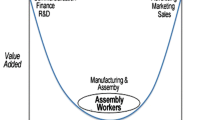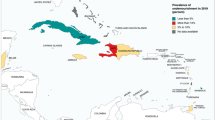Abstract
In a world where issues of food safety and food security are increasingly important, the social responsibility of central actors in the food chain—producers and the main grocery chains—becomes more pressing. As a response, these actors move from implicitly assuming social responsibilities implied in laws, regulations and ethical customs, towards explicitly expressing social responsibilities. In this paper, we discuss the ethical values relevant for the social responsibility of central food producers and retailers in Norway, one of the most subsidized and protected areas of food production in the world. How do the actors perceive and express their social responsibility, and—given their position in the local, national and global market—how should they handle these responsibilities? We analyze Tine and Nortura, two producers owned by farmer cooperatives with market regulator function, as well as Coop—a dominant grocery chain in Norway, with basis in the same public ownership model as the farmer-owned cooperative producers. While the complex roles of these key actors in the Norwegian food market have been criticized from several angles, we argue that these multifaceted roles put them in a good position to promote informed consumer choices in a globalized market.
Similar content being viewed by others
Notes
Norway is not part of the EU, but in close cooperation with the EU as part of the European Free Trade Assosciation, ETFA, together with the other EFTA member states Iceland, Liechtenstein, and Switzerland.
The KLS requirements address food quality, food safety and animal welfare. See http://www.matmerk.no for further details (in Norwegian).
References
Aerni, P. (2009). What is sustainable agriculture? Empirical evidence of diverging views in Switzerland and New Zealand. Ecological Economics, 68(6), 1872–1882.
Almås, R., & Gjerdåker, B. (2004). Norwegian agricultural history. Trondheim: Tapir Academic Press.
Bolli, R. (2014). Rester av plantevernmidler i næringsmidler 2013. Oslo: Mattilsynet and Bioforsk.
Brunstad, R. J., Gaasland, I., & Vårdal, E. (2005). Multifunctionality of agriculture: An inquiry into the complementarity between landscape preservation and food security. European Review of Agricultural Economics, 32(4), 469–488.
Burton, R., & Wilson, G. A. (2012). The rejuvenation of productivist agriculture: the case for ‘cooperative neo-productivism’. Rethinking agricultural policy regimes: Food security, climate change and the future resilience of global agriculture (Research in Rural Sociology and Development, Volume 18), pp. 51–72.
Carson, S. G., Hagen, Ø., & Sethi, S. P. (2015). From implicit to explicit CSR in a Scandinavian context: The cases of HÅG and Hydro. Journal of Business Ethics, 127(1), 17–31.
Christensen, T., & Lægreid, P. (2001). New Public Management: The effects of contractualism and devolution on political control. Public Management Review, 3(1), 73–94.
Christman, J., & Anderson, J. (2005). Autonomy and the challenges to liberalism: New essays. Cambridge: Cambridge University Press.
COOP. (2015a). Coop - Kundenes egen handelsaktør. https://coop.no/om-coop/virksomheten/. Accessed 10 March 2016.
COOP. (2015b). Historie. https://coop.no/om-coop/virksomheten/coop-norge-sa/historie1/historie/. Accessed 10 March 2016.
Cunningham, A. (2003). Autonomous consumption: Buying into the ideology of capitalism. Journal of Business Ethics, 48(3), 229–236.
Daugstad, K., Rønningen, K., & Skar, B. (2006). Agriculture as an upholder of cultural heritage? Conceptualizations and value judgements—A Norwegian perspective in international context. Journal of Rural Studies, 22(1), 67–81.
De Tavernier, J. (2012). Food citizenship: Is there a duty for responsible consumption? Journal of Agricultural and Environmental Ethics, 25(6), 895–907.
Dibden, J., & Cocklin, C. (2009). ‘Multifunctionality’: Trade protectionism or a new way forward? Environment and planning A, 41(1), 163.
Ekern, Y. (2013). Båten som berger oss. Aftenposten. http://www.aftenposten.no/nyheter/iriks/Baten-som-berger-oss-7137776.html. Accessed 1 April 2016.
English, N. i. (2014). EU blasts Norway’s protectionism. http://www.newsinenglish.no/2013/07/05/eu-blasts-norways-protectionism/.
Farsund, A. A. (2014). Norsk jordbruk i krysspress mellom nasjonal og internasjonal politikk. Norsk statsvitenskapelig tidsskrift, 02, 85–107.
FIVH. (2012). Nyt Afrika! http://www.framtiden.no/201209045753/aktuelt/mat/nyt-afrika.html. Accessed 5 March 2016.
Folsland, J. (2003). Godt Norsk ikke godt nok. Nationen. http://tinyurl.com/p3erct8. Accessed 5 March 2016.
Gaasland, I. (2009). Agriculture versus fish–Norway in WTO. Food Policy, 34(4), 393–397.
Gjølberg, M. (2010). Varieties of corporate social responsibility (CSR): CSR meets the “Nordic Model”. Regulation & Governance, 4(2), 203–229.
Hageberg, E. (2014). Østerrisk alpejordbruk. Oslo: Agri analyse.
Halkier, B., Holm, L., Domingues, M., Magaudda, P., Nielsen, A., & Terragni, L. (2007). Trusting, complex, quality conscious or unprotected? Constructing the food consumer in different European national contexts. Journal of Consumer Culture, 7(3), 379–402.
Heie, K. (2003). Viable small scale farming in Norway. In 14th Congress, Perth, Western Australia, August 10–15, 2003 (Vol. 24386). International Farm Management Association.
Høyesterett, N. (2011). Prøving av Konkurransetilsynets vedtak om ileggelse av overtredelsesgebyr. https://www.domstol.no/no/Enkelt-domstol/-Norges-Hoyesterett/Avgjorelser/Avgjorelser-2011/Avdeling/Sivile-saker/Saken-gjelderproving-av-Konkurransetilsynets-vedtak-om-ileggelse-av-overtredelsesgebyr/. Accessed 1 April 2016.
Hvamstad, E. (2010). Coop utfordrer Tine-melk. Hegnar Online. http://www.hegnar.no/Nyheter/Naeringsliv/2010/09/Coop-utfordrer-Tine-melk. Accessed 5 March 2016.
Jacobsen, E. (2004). Norsk mat i et åpent marked. Oslo: SIFO.
Kampanje. (2012). Åtte reklamemilliarder i spill. http://kampanje.com/archive/2012/01/–atte-reklamemilliarder-i-spill/. Accessed 10 March 2016.
Kjærnes, U., Borgen, S., Borch, A., & Lavik, R. (2010). Tillit til kjøtt—endringer og utfordringer i det norske markedet. SIFO Project Report.
Korthals, M. (2001). Taking consumers seriously: Two concepts of consumer sovereignty. Journal of Agricultural and Environmental Ethics, 14(2), 201–215.
Kvakkestad, V., Rørstad, P. K., & Vatn, A. (2015). Norwegian farmers’ perspectives on agriculture and agricultural payments: Between productivism and cultural landscapes. Land Use Policy, 42, 83–92.
Landbrukssamvirke, N. (2015). Den norske landbruksmodellen. http://www.landbruk.no/Politikk/Nasjonalt/Den-norske-landbruksmodellen. Accessed 10 March 2016.
Listhaug, S. (2014). Regjeringens 100 dager er over – hva nå? https://www.regjeringen.no/no/aktuelt/regjeringens-100-dager-er-over–hva-na/id749287/. Accessed 10 March 2016.
Løkeland-Stai, E., & Lie, S. A. (2012). En nasjon av kjøtthuer: ni myter og en løgn om norsk landbrukspolitikk. Oslo: Manifest.
Lundeberg, H. (2012). Nyt Afrika-kampanjen er naiv. Aftenposten. http://www.aftenposten.no/meninger/Nyt-Afrika-kampanjen-er-naiv-7060552.html. Accessed 10 March 2016.
Matmerk. (2015). www.matmerk.no. Accessed 25 June 2015.
Matten, D., & Moon, J. (2008). “Implicit” and “explicit” CSR: A conceptual framework for a comparative understanding of corporate social responsibility. Academy of Management Review, 33(2), 404–424.
McWilliams, J. E. (2009). Just food: Where locavores get it wrong and how we can truly eat responsibly. Boston: Little, Brown.
Midttun, A., Gautesen, K., & Gjølberg, M. (2006). The political economy of CSR in Western Europe. Corporate Governance, 6(4), 369–385.
Myskja, B. K. (2015). Etisk forbruk - mat, tillit, nærhet og rettferdighet. In N. M. Iversen (Ed.), Norske matvarer (pp. 39–59). Bergen: Fagbokforlaget.
NORM/NORM-VET. (2014). Usage of antimicrobial agents and occurrence of antimicrobial resistance in Norway. Tromsø/Oslo: NORM/NORM – VET 2O14.
Nortura. (2015a). Merkevarene våre. http://www.nortura.no/gir-matglede-rundt-spisebordet/merkevarene-vare/. Accessed 10 March 2016.
Nortura. (2015b). Vedtekter. http://www.nortura.no/om/vedtekter/. Accessed 10 March 2016.
Nortura. (2016). Trygge råvarer fra norske bønder. http://www.nortura.no/naturlig-kvalitet-fra-norske-bonder/. Accessed 1 April 2016.
OECD. (2013). Producer support estimates (subsidies). Agriculture and Food: Key Tables from OECD. doi:10.1787/20755104.
Oikos. (2013). Rekordår for heløkologiske Rørosmeieriet. http://www.oikos.no/aktuelt/rekord-for-helokologiske-rorosmeieriet. Accessed 5 March 2016.
Øst, B. (2013). Økte avlinger kan gi miljøgevinst. http://www.bioforsk.no/ikbViewer/page/forside/nyhet?p_document_id=102819. Accessed 10 March 2016.
Prestegard, S. S. (2005). Multifunctional agriculture, non-trade concerns and the design of policy instruments: Applications to the WTO agricultural negotiations. International Journal of Agricultural Resources, Governance and Ecology, 4(3–4), 232–245.
Roer, A.-G., Johansen, A., Bakken, A. K., Daugstad, K., Fystro, G., & Strømman, A. H. (2013). Environmental impacts of combined milk and meat production in Norway according to a life cycle assessment with expanded system boundaries. Livestock Science, 155(2–3), 384–396.
Rosendal, G. K. (2012). Adjusting Norwegian agricultural policy to the WTO through multifunctionality: Utilizing the environmental potential? Journal of Environmental Policy & Planning, 14(2), 209–227.
Røvik, A. (2007).Trender og Translasjoner: Ideer som former det 21. århundrets 0rganisasjon [Trends and translations: Ideas shaping the 21st century’s organization]. Oslo: Universitetsforlaget.
Schultz, M., Hatch, M. J., & Larsen, M. H. (2000). The expressive organization: Linking identity, reputation, and the corporate brand. Oxford: Oxford University Press.
SIFO. (2014). Kjøtt og reklame - en studie av annonsering og reklame for kjøtt i det norske matmarkedet. Oslo: SIFO.
Simpson, J. R. (2005). Japan’s non-trade concerns: Legitimate or protectionist? International Journal of Agricultural Resources, Governance and Ecology, 4(3–4), 344–359.
Steensnæs, E., Gustavson, B., Sjurgard, G., Angell, T., Kløvstad, B., Hasselgård, H., et al. (2011). Mat, makt og avmakt - om styrkeforholdene i verdikjeden for mat. Norges Offentlige Utredninger 2011 (4). https://www.regjeringen.no/no/dokumenter/nou-2011-4/id640128/?q=NOU%20Dagligvarehandelen&ch=1. Accessed 16 August 2015.
Storstad, O. (2007). Naturlig nært og trygt. En studie av hvordan forbrukertillit til mat påvirkes av produksjonsmåte og matskandaler. Doktoravhandling, NTNU, Trondheim.
Storstad, O., & Bjørkhaug, H. (2003). Foundations of production and consumption of organic food in Norway: Common attitudes among farmers and consumers? Agriculture and Human Values, 20(2), 151–163.
Stortingsmelding. (2011–2012). Meld. St. no. 9 Landbruks- og matpolitikken - Velkommen til bords. https://www.regjeringen.no/no/dokumenter/meld-st-9-20112012/id664980/. Accessed 1 April 2016.
Strand, R., & Freeman, R. E. (2013). Scandinavian cooperative advantage: The theory and practice of stakeholder engagement in Scandinavia. Journal of Business Ethics, 127(1), 65–85.
Suchman, M. (1995). Managing legitimacy: Strategic and institutional approaches. Academy of Management Review, 20(3), 571–610. doi:10.5465/AMR.1995.9508080331.
Tennbakk, B. (2004). Cooperatives, regulation and competition in Norwegian agriculture. Acta Agriculturae Scandinavia Section C—Food Economics, 1(4), 232–240.
Terragni, L. (2004). Institutional strategies for the production of trust in food in Norway. Trust In Food Working Paper Series No.
Tine. (2014). Visjon og verdier. http://www.tine.no/om-tine/organisasjonen/visjon-og-verdier. Accessed 10 March 2016.
Tine. (2015). Samvirket Tine. http://www.tine.no/om-tine/organisasjonen/samvirket-tine. Accessed 10 March 2016.
Ursin, L. O. (2015). Er vi forpliktet til å produsere mat i Norge? Om det økologiske og økonomiske grunnlaget for norsk matproduksjon. In N. M. Iversen (Ed.), Norske matvarer (pp. 23–37). Bergen: Fagbokforlaget.
Vølstad, T. (2005). Kan være meget alvorlig. Aftenbladet. http://www.aftenbladet.no/nyheter/okonomi/--Kanvare-meget-alvorlig-2588450.html. Accessed 1 April 2016.
Acknowledgments
We thank the Research Council of Norway for funding parts of this research. Some aspects of the theme of this article were discussed by the present authors at the 2015 EurSafe conference “Know your food”, and fragments of the present article is included in our extended abstract in conference proceedings, under the title “Fair, local and environmentally sound? Corporate social responsibility in Norwegian food production” We would like to thank the audience at our presentation for their stimulating comments, and Wageningen academic publishers for allowing us to use some of the formulations of the extended abstract in the present article.
Author information
Authors and Affiliations
Corresponding author
Ethics declarations
Conflict of interest
The authors Ursin and Myskja have taken part in the transinstitutional (e.g. including general marketing and biochemical analyses of Norwegian food products) research project Eco-values as product quality attributes in manufacturing of agricultural food ingredients, funded by the Research Council of Norway, with financial contributions from several Norwegian food value chain actors, including Tine, Nortura and Coop. The aim of the ethics part of the Eco-values project was to analyse and criticise central aspects of Norwegian food production.
Rights and permissions
About this article
Cite this article
Ursin, L., Myskja, B.K. & Carson, S.G. Think Global, Buy National: CSR, Cooperatives and Consumer Concerns in the Norwegian Food Value Chain. J Agric Environ Ethics 29, 387–405 (2016). https://doi.org/10.1007/s10806-016-9609-8
Accepted:
Published:
Issue Date:
DOI: https://doi.org/10.1007/s10806-016-9609-8




